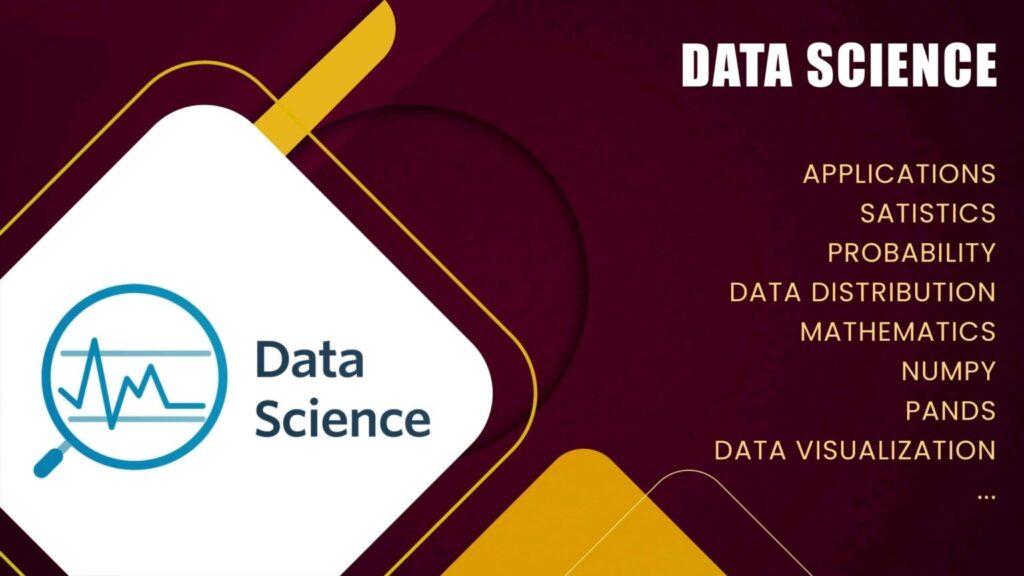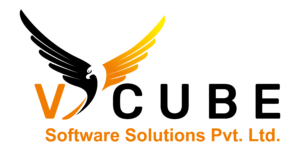DATA SCIENCE
DATA SCIENCE TRAINING
DATA SCIENCE : It is an interdisciplinary field that uses scientific methods, algorithms, and systems to extract knowledge and insights from many structural and unstructured data. Power BI is an all-in-one high-level tool for the data analytics part of data science. It can be thought of as less of a programming-language type application, but more of a high-level application akin like Microsoft Excel.
Duration:60 days

AI and DATA SCIENCE using PYTHON
Lesson 01 – Data Science & Data Analytics Overview
- Introduction to Artificial Intelligence, Machine Learning, Deep Learning
- Relationship between AI, ML,DL, and Data Science
- Introduction to Data Science
What is Data Science
Why Data Science
- Components of Data Science
- Applications of data science
- Why Python for Data Science
Lesson 02 – Python Overview & Environment Setup
- Installation of Anaconda Python
- Variables, Standard Data Types, Basic Operators
- Functions, Modules,
- String,
- List, Tuple,
- Dictionary, Set
- List comprehension, Dictionary comprehension. Set Comprehension
- Regular expressions
- Python File I/O
- Database Operations using Sqlite
- Generators, Iterators, Decorators.
- Collections Module
- Object Oriented Python,
- Class, Object
- Abstraction, Encapsulation, Inheritance, Polymorphism
- CSS, Web Scraping, Flask web application Framework
- Project on Python data structures
Part – 02
Lesson 03 – Descriptive Statistics, Distributions and Visualization
- Central Tendency (mean, median, and mode)
- Measures of Variation(Interquartile Range, Variance, Standard Deviation)
- Bar Chart, Histogram, Box whisker plot, Scatter Plot
- Co-variance, Correlation
- Binomial Distribution, Normal Distribution
- Skewness and Kurtosis
Lesson 04 – Inferential Statistics
- Central Limit Theorem
- Z Test, T-Test, P-value
- Hypothesis testing
- Chi-Square, F- Statistic
- Sampling Techniques
Part – 03
Lesson 05 – Mathematical Computing with Python (NumPy)
- Introduction to NumPy, N-D array
- Mathematical Functions of NumPy
- Data types and attributes of Arrays
- Array Indexing and Slicing
- 1-D arrays and N-D arrays
- Array broadcasting
Lesson 06 – Data Manipulation with Pandas
- Introduction to Pandas,
- Understanding Data Frame
- Transforming List, Tuples, and Dictionaries into Data Frame
- Accessing rows and columns, Iteration over Data Frames
- Pandas joining and merging,
- Pandas Group by, Pivot Table, Binning,
- Pandas Visualization
- Data Generation
- Real-time Case Studies on Data Analysis based on Kaggle
Lesson 07 – Exploratory Data Analysis and Data Visualization
- Univariant analysis
- Bivariant analysis
- MatplotLib
Lesson 08 – Data Preprocessing/Wrangling/Munging Techniques
- Data Imputation (Missing values)
- Data Encoding Techniques (Label Encoding, One hot encoding.)
- Finding Outliers
- Data Normalization, Transformation, Scaling
- Dimensionality Reduction Techniques
- PCA- Principle Component Analysis
- SVD- Singular Value Decomposition
- LDA- Linear Discriminant analysis
- Feature Selection (Importance) and Engendering techniques
- Case Studies on Data Preprocessing techniques
Part -04
Lesson 9 – Regression Analysis
- What is regression, Linear regression
- Linear regression, Multiple Regression
- Ridge Regression, Lasso Regression
- Explanation of Statistics
- Evaluation metrics (R-Squre, Adj R-Square, MSE, RMSE)
- Train/Test Split, Hypothesis testing formal way
- Case Studies
- Project on Regression Analysis from Kaggle
Lesson 10 – Classification
- Introduction to Machine Learning
- Naïve Bayes classifier
- Decision Tree classifier
- Support Vector Machines
- KNN classifier
- Logistic Regression
- Support Vector Machines (SVM)
- Ensemble models (Random Forest, Bagging, Boosting)
- Xg boost in depth with Industry cases
- Backpropagation using Neural Networks
- SK Learn ML library using Python
- Case Studies
- Project on Classification Algorithms from Kaggle
Lesson 11 – Model Selection and Evaluation
- Accuracy measurements
- Precision, Recall, Precision-Recall Tread-off
- AUC Score, ROC Curve
- Train/Validation/Test split, K-Fold Cross Validation
- The Problem of Over-fitting (Bias-Variance tread-off)
Lesson 12- Learning Best Practices for Model Evaluation
- Bias, Variance, Overfitting, Underfitting methods
- Pipelining
- Parameter Tuning mechanisms (Grid Search, Random Search)
- Debugging algorithms with learning and validation curves
- Deployment of models into Flask
Part -05
Lesson 13– Association Analysis
- Association Rules & Interesting measures
- Apriori Algorithm
- FP-Growth algorithm
- Case Studies
Lesson 14 – Clustering
- Similarity distance measures
- K-means Clustering
- Hierarchical Clustering
- DB Scan Clustering
- Case Studies
Part -06
Lesson 15 – Natural Language Processing
- NLP Overview, Applications using NLTK, Text Blob
- Tokenizing, Stop Word Removal, Stemming, Lemmatization, POS Tagging,
- Similarity measures over Text,
- Vector Space Model, Bag of words,
- transforming text to Numeric using Count Vectorizer
- Text Classification,
- Text Clustering,
- Topic Modelling,
- Model Deployment using NLP
- Word Embeddings, Sentiment Analysis
- Case Studies
- Project on NLP from Kaggle
Part -07
Lesson 16 – Image Processing using CV2
- Image Processing Basics and Computer Vision Library
- Images Operations using Numpy
- Blending and Pasting
- Image Threshold
- Morphological Operations
- Edge detection
- Contour detection
- Feature Marching
- Face detection
Lesson 17- Deep Learning using TensorFlow and Kera’s.
- Introduction to Deep Learning, Neurons, Perceptron, Multilayer Perceptron,
- Forward Propagation, Backward Propagation, Activation Functions,
- Artificial Neural Networks, Case Studies
- Convolution Neural Networks, Case Studies
- Recurrence Neural Networks, Case Studies
- Model Deployment using Deep Learning
- Deep Learning with Text
- Word Embedding
- Transformers using Hugging Faces
- Encoders and Decoders
- Attention mechanism
Part -08
Lesson 18- Applications
- Time Series Analysis
- Recommendation Systems (Filter based RS and Collaborative based RS)
- Saving Models, Deployment of models into Flask
- Industrial Case Studies
Part -09
Lesson 19- Explainable AI
- Need for Explainable AI in the Industry
- SHAP
- LIME
- Industrial Case Studies
Part -10
Lesson 20- Generative AI using Gemini AI
- Gen AI text
- Gen AI images
- Retrieval-Augmented Generation
- Case Studies on Gen AI and Other
Lesson 21- Git hub, Azure/AWS/GCP deployment of various domain projects
Features of the course
- Case Study based Teaching
- Industrial persons involve in Industrial case studies
- Interview-based training
Course's Key Highlights
![]() 100+ hours of learning
100+ hours of learning![]() Real-time industry professionals curate the course.
Real-time industry professionals curate the course.
![]() Internships and live projects
Internships and live projects
![]() A cutting-edge training facility
A cutting-edge training facility
![]() Dedicated staff of placement experts
Dedicated staff of placement experts
![]() Placement is guaranteed 100 percent Assistance
Placement is guaranteed 100 percent Assistance
![]() 28+ Skills That Are Useful in the Workplace
28+ Skills That Are Useful in the Workplace
![]() Trainers with a minimum of 12 years of experience
Trainers with a minimum of 12 years of experience
![]() Videos and back-up classes
Videos and back-up classes
![]() Subject Matter Experts Deliver Guest Lectures
Subject Matter Experts Deliver Guest Lectures
Description of the Data Science Course
Data Analysis Courses in Hyderabad
Why data science is so popular?
Data Science: In the wonderful and vast world of data science in 2020, there are a plethora of options and approaches to analytics and machine learning. While most data scientists approach a solution using popular programming languages such as Python, R, Scala, or even Julia, some higher-level implementations can get the job done in some cases. Microsoft’s Power BI is a great example of this.
You will need a Windows system to install Power-Bi. I’m a Fedora user, so I used Gnome’s Boxes to boot up a new virtual kernel. Boxes is a QEMU GUI that makes it incredibly simple to run multiple virtual systems under one operating system at the same time. Alternatively, you could always use the application’s online version. In my limited experience with the web-friendly version, I discovered that the features are rather lacking in comparison and are frequently split between the two.
Upskill & Reskill For Your Future With Our Software Courses
Best Data Science Institute in Hyderabad

Quick Links
- Home
- About Us
- Courses
- Contact Us
Other Pages
Contact Info
- 2nd Floor Above Raymond’s Clothing Store KPHB, Phase-1, Kukatpally, Hyderabad
- +91 7675070124, +91 9059456742
- contact@vcubegroup.com
